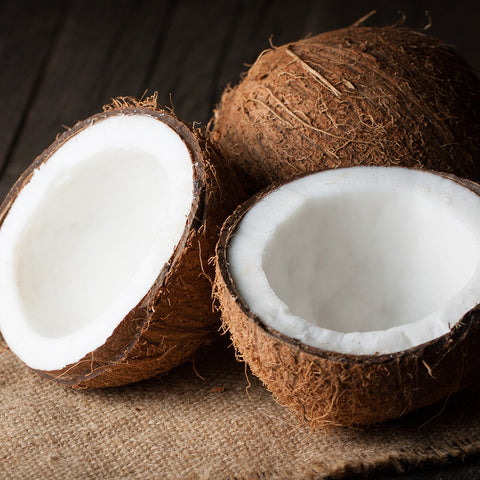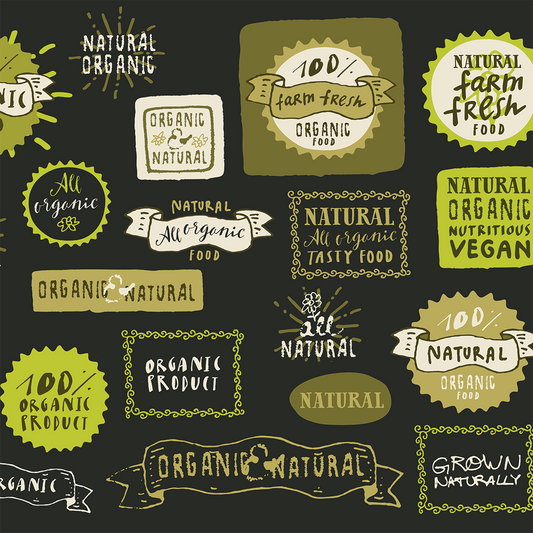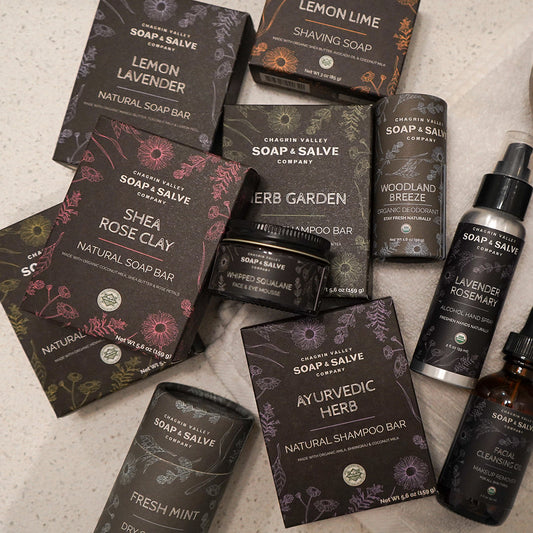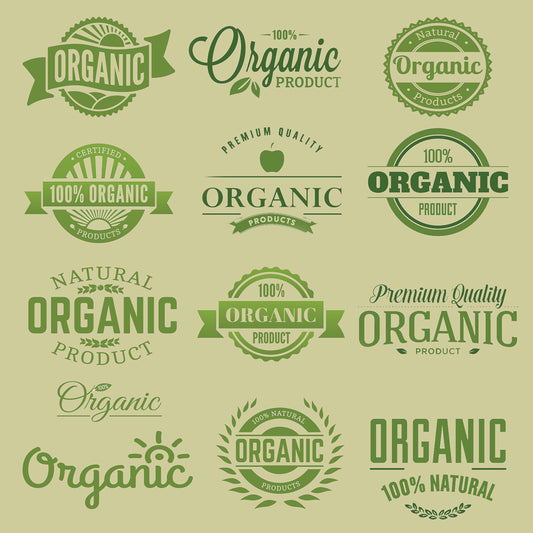Beware Of Misleading Skin Care Labels
Consumers are looking for more and more natural and organic products, but the terms natural and organic on a label are often meaningless, especially in personal care products.
 Many of us believe that the information written on a product label means something. Sadly, this is often not the case.
Many of us believe that the information written on a product label means something. Sadly, this is often not the case.
Personal care companies use every marketing gimmick in their arsenal, from catchy buzzwords, misleading labels, pseudo-science, and even creating natural-sounding brand names and product designs to convince us that their skin care is good for your skin and the planet.
Show Me Those Perfect Words
"Natural" “Clean” “Organic” “Green” "Derived from Nature" "Non-toxic"
You find trendy words like these slapped on every product label. These are the words marketing teams use to greenwash products and market them towards health-conscious customers. What do these words mean? Actually, not much!
Many so-called natural personal care products on store shelves contain a myriad of synthetic preservatives, colors, fragrances and other unnatural ingredients that are sourced, created, and processed in very "unnatural" ways.
While many companies use these buzzwords, they often cannot substantiate their claims. Watch out for these skin care marketing terms and remember that the ingredient list will tell you all that you need to know.
Many companies are not selling "organic" products; they are simply selling the word "organic."
They are not selling "natural" products; they are selling the word "natural."
Vying to keep up with this "green/natural/organic/clean" trend, companies invest tons of money into creating "natural" marketing campaigns.
Rather than formulating their products honestly with genuine natural and organic ingredients, they use clever marketing tactics to make money at the expense of the trusting consumer.
Learn More Blog "We Need To Do Away With The Word Natural."
Here are a few examples of how labels can be misleading
Beware of brands where the company name has the words "organic" or "natural" in its title. For example, we could name a company "Darby's Organics" or "Darby's Naturals." Unfortunately, if you read the product ingredients, they are often neither organic nor natural!
 A product label will state, “Made with 90% natural Ingredients.” The first ingredient on the label is water. The alleged natural ingredients are mostly "the water" and I guess water is a natural ingredient. However, the remaining ingredients are synthetic.
A product label will state, “Made with 90% natural Ingredients.” The first ingredient on the label is water. The alleged natural ingredients are mostly "the water" and I guess water is a natural ingredient. However, the remaining ingredients are synthetic.
A product label will state, "Made with all-natural ingredients," or "made with organic ingredients." This leads the consumer to believe that the product is really natural or organic. Unfortunately, there is often just a small amount of truly all-natural or organic material in the product. In reality, the product is filled with mostly synthetic fillers, dyes, and fragrances.
The product may be "made with" some small amount of all-natural or organic ingredients so the claim is true, even though misleading. (The words "Made With Organic Ingredients" only have real meaning if the company is a USDA Certified Organic company.)
A product label will state, "Made with 100% natural ingredients," or "made with 100% organic ingredients." The "100%" claim often refers to one or two ingredients, which are "100% natural," or "100% organic," even if other ingredients are synthetic.
A soap label will state, "scented with natural . . ." sandalwood, jasmine, and rose oils." The cost of these expensive essential oils and absolutes ranges from $200.00 to $500.00 or more per ounce. A small size (4.5 oz.) bar contains about 1/4 ounce of essential oil. That means that the cost of the essential oils alone in one bar of soap would be from $50.00 to 125.00+ dollars.
Yet companies are selling these bars for $5.95. How is that possible? Unless the company is not in business to make a profit. Sometimes a company is simply dishonest. Sometimes they add a few drops of essential oils mixed with synthetic fragrance oils.
The FDA does not require soap labels to list all ingredients. While it may be true that they are using a bit of real essential oil to scent the bars, this practice is misleading and deceptive.
A product label will state, "all-natural." But when you read the product's label if the ingredients include the words "fragrance," "perfume," or "parfum," then it is a synthetic scent and not natural, even though the packaging may say "natural."
Always question the words "safe synthetic." Who actually determined these synthetic ingredients were safe?
Handmade vs Natural
Be mindful of the fact that not every personal care product that is handmade is natural. Soap is a perfect example of this. Not all handmade soap is natural soap. Some contain synthetic fragrances, colors, and even detergents.
Many soapmakers make handmade soaps with beautiful synthetic colors and fragrances--it can be a true art form. Now that's okay if that is what you are looking for. But if you want a natural soap for your family, be sure to read the ingredients.
Read our blog "Are All Handmade Soaps the Same?"
Derived From, Naturally Derived From, Made From! Seriously?
You will often see these words listed before or after an ingredient in a skincare product. So what do they mean?
As usual, there is no standard for these terms, so the consumer is left scratching their heads and asking the question, "Is this product natural?"
 Coconut is still considered natural whether it is whole, dried, or shredded. We can even obtain natural coconut oil, coconut milk, and coconut with minimal changes to the original coconut.
Coconut is still considered natural whether it is whole, dried, or shredded. We can even obtain natural coconut oil, coconut milk, and coconut with minimal changes to the original coconut.
However, once the oil is biochemically altered, it then becomes naturally derived or even synthetic.
A product label will list an ingredient followed by the phrase “derived from …some natural substance." For example, coco sulfate, a detergent often found in foaming and lathering products, can be derived from the fatty acids of natural coconut oil.
Although this ingredient may begin as natural coconut oil, by the time it is separated, processed, and chemically altered to create a foam boosting agent, it is far from coconut oil and far from natural!
A product label will list a chemical ingredient followed by the phrase “naturally derived from …some natural substance." The words "naturally derived" live in a gray area because it is difficult to know if the ingredient is closer to natural or synthetic.
Just how far down the road from its natural source has this ingredient traveled? Some of these ingredients may be minimally processed and therefore are closer to their natural source. But others have been processed many times, and depending on the “process” they may not resemble the original botanical ingredient at all.
What determines the “naturalness” of a derived ingredient totally depends on the type of process used to manufacture that ingredient. Unfortunately, the consumer is not provided with this information.
A product label will list a chemical ingredient followed by the phrase “made from …some natural substance." Your guess is as good as mine.
These labels and this type of marketing are misleading for consumers.
Of course, I believe that the less processing the better--that is also true for the food we put in our bodies.
I am not saying that all of these ingredients are inherently bad. I just believe that consumers have the right to know exactly what is in the products they are purchasing without vague hints of everything being natural.
Conclusion
One customer sent us an email concerning a company selling "organic age-defying cream," "organic face cream," and several other "organic" products. He emailed them to ask about their organic certification and was told that the items were not certified organic, but were made with "some" organic ingredients. This customer was angry and frustrated because he could not find a place to report the "blatant misinformation."

You may wonder how companies can get away with such misleading information. There is very little, if any, monitoring of claims made by the personal care product industry.
When choosing items that make "organic" claims, look for USDA Organic Certification information on the website or label. If it is not there -- ASK!
Read about Chagrin Valley Soap's Organic Certification
Buyer Beware! Carefully Read The Labels On Your Favorite Skin Care Products!
As you shop, keep in mind all of the "natural," "organic," "derived from," etc. marketing gimmicks used by companies to sell their products. As you pick up a product, think about what caught your eye. Remember, their job is to entice you to buy their products.
The trendy buzzwords, pastoral scenes of gardens, herbs, flowers, and anything natural, plus the brand name, logo, and packaging design, are all there to appeal to your sense of family and social responsibility.
Now that you are armed with this information, you will read the ingredient list and make more informed decisions.
At Chagrin Valley Soap and Salve, we do not stretch the meaning of "natural" or "organic." We proudly list ALL of the ingredients in our products so you can make a truly "informed" decision about your skincare needs.
We value the word "organic" and have spent the time
and money to become a USDA Certified Organic company.


